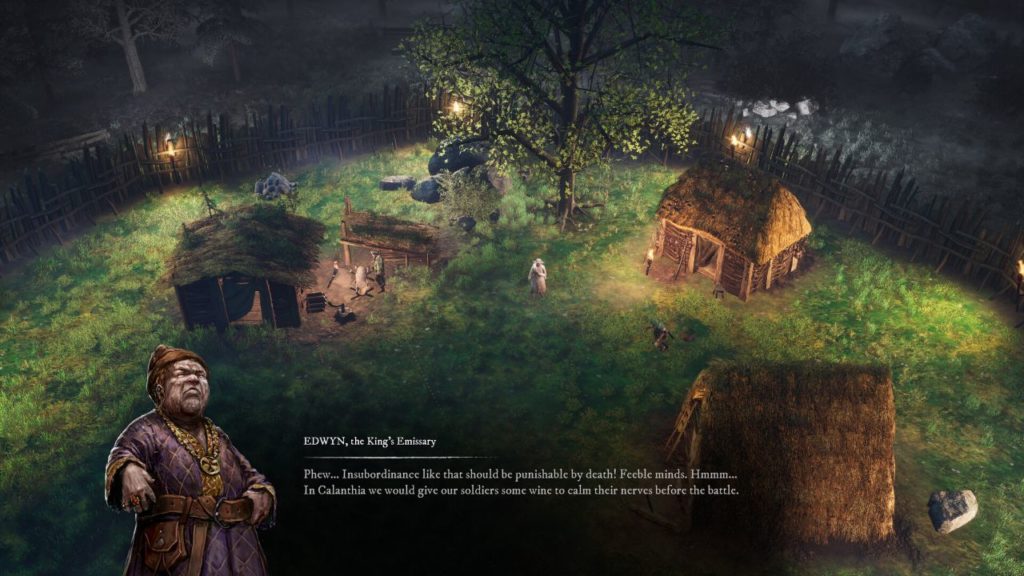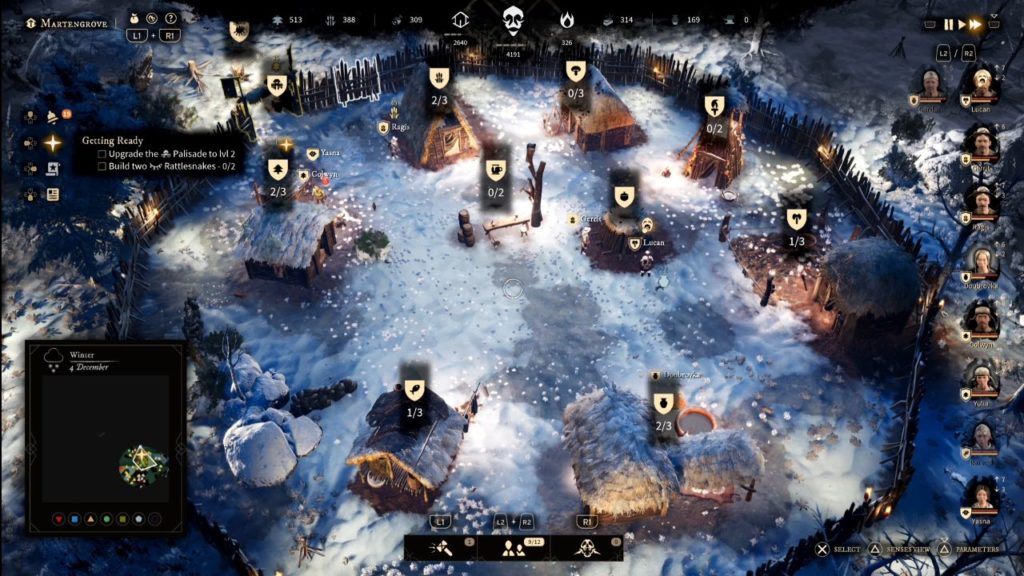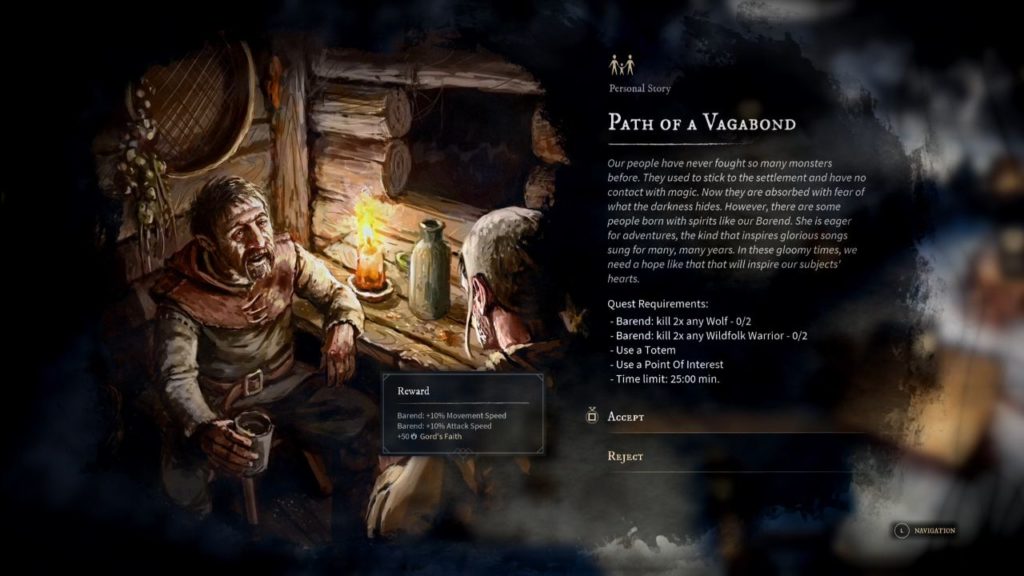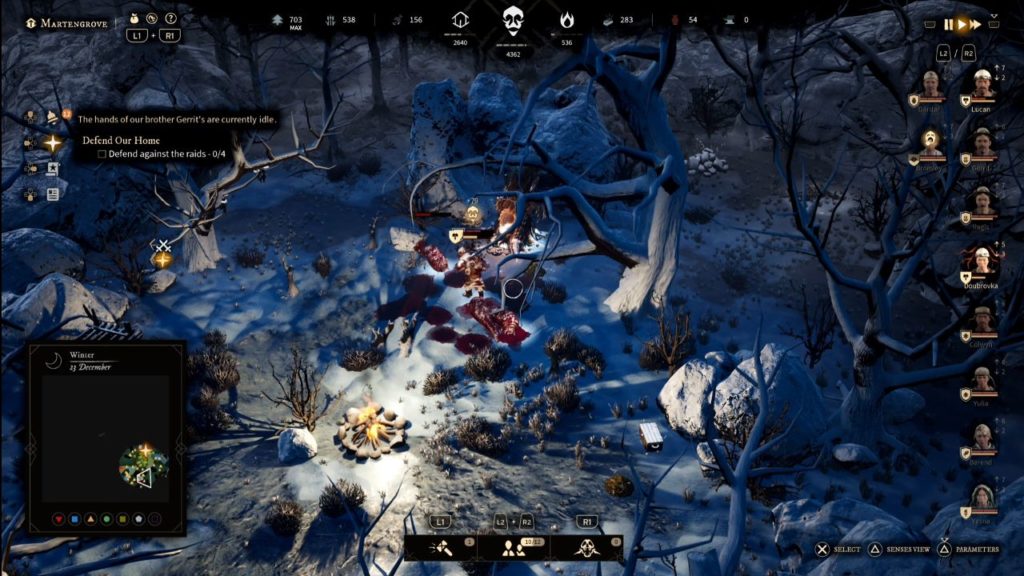Gord review
Gord is pretty grim. It’s a game that does for base-building what Darkest Dungeon did for turn-based RPGs. Half the battle here is finding any kind of happy ending for a given scenario; although once you accept that there won’t be one, you’ll probably have a better time.
It’s set in a fantasy version of Dark Age Europe, where your king has dispatched you to tame the wildlands and make way for his invading force. As his Steward, you have the final say on how best to spend the short time you have, but you’re not alone. Several advisors will travel with you, and offer advice along the way.
There’s Boghdan, leader of the Tribe of Dawn, a local clan that works with you and lends you their people as workers and fighters. Then there’s Edwyn, an emissary to the king and full-time snivelling wretch. Later you’ll meet Lynx, a witch of the wilds who can call down incantations to help you in or out of battle.

The campaign is split into Scenarios that have a clear goal. Completing one will advance you to the next stage of the Campaign, and often undo a lot of what you did previously. The structure is odd but keeps you busy, allowing you to use what you’ve learned each time. If you want a more straightforward base-building sim, you can opt for the free play mode instead.
However, if you don’t play Gord’s campaign you’ll miss out. It’s not the kind of game I’d describe as “fun”, but it is a very playable, very simple-to-understand settlement sim. While some Scenarios start you off with a few basic buildings already constructed, many start with you laying down your Palisade, the fenced circle within which you’ll establish your Gord. From here you’ll assign the few villagers you have to undertake various tasks.
You can name the villagers before starting if you like, and choose the ones that have specific skills or experience, but ultimately it won’t really matter as anyone can do anything. Once a building is constructed, you assign a villager to it to give them the corresponding profession. A fishing hut creates a fisherman, for example, while a lumber mill creates lumberjacks. It’s pretty easy to understand.

That said, you’ll have limited villagers at the start of each Scenario, and will need to assign them carefully. It’s also important to have scouts, archers and axe-wielders to defend your gord from invaders. Likewise, the world beyond the gord is hostile and dark. You won’t see the sun much in this game, and venturing beyond the palisade at all is a risk. There are wolves, imps, giant burrowing worms, hostile tribes, huge spiders, and evil spirits – to name a few of the dangers. You’ll often need to assign a warrior to guard and escort gatherers to keep them alive.
Later you’ll construct temples to generate Faith, which allows Lynx to cast Incantations. You’ll need a meadery to restore lost stamina, and a balia where your people can bathe and regenerate health. There are more structures than you can usually fit into a single gord, meaning you’ll need to decide which are essential to the current objective.
If your people spend too long in the dark or fighting off monsters, they’ll begin to lose their sanity. In fact, working them too hard at all is a recipe for disaster. Gord doesn’t have a day-night cycle so you won’t need to send people to bed, but allowing them some downtime is important. Sadly, you simply can’t hide away in your gord forever, either. Many quests and Scenarios force you to venture out exploring, or slaying local threats, finding lost NPCs, or locating distant resources.

Every so often, a child will be born to your gord which you can name. As time passes they will grow, and can eventually join the ranks of workers and warriors. It’s not likely you’ll become too attached, even though you can name them, but it’s nice to see your gord slowly grow as you explore the world.
Like I said, though, Gord is grim. You won’t only be dealing with the sanity of your villagers or the bickering between your advisors; you’ll also be forced to make tough decisions regularly. An early one places a monstrosity before you that demands you either destroy it or sacrifice a child to it. At first I tried to fight it, but it annihilated my squad of axe warriors in seconds. So instead I decided to make the tough choice and sacrifice little Halfrid, assuming it would just happen off-screen and allow me passage.
Nope. I was treated to a cutscene where we left little Halfrid in the swamp and the monstrosity grabbed her in its tentacles and then ate her whole. It was decidedly unpleasant to watch. But that’s what Gord is, from top to bottom: pretty unpleasant. And yet, it’s also quite addictive to play. Because I could probably have saved Halfrid had I dedicated myself to increasing the number of axe-warriors and archers, and set about mining clay and then iron to upgrade my buildings and gear.

Exploration yields items, resources, and rare trinkets that can buff the individual carrying them. Sometimes you’ll find shrines in the wilds that boost your experience or grant extra Faith and regeneration. You might find warriors and workers locked in cages who will join you if you let them, increasing the number of mouths to feed but providing you with a potential new fighter or forager. Trade-offs pop up now and then that require your attention, such as a villager losing their memory in a fall, or being offered a boon by the gods if they complete a series of feats in the wilds.
Gord isn’t particularly good-looking, but the atmosphere rarely lets up. As a story-driven settlement sim, it offers a moderate amount of replayability and a pretty compelling central narrative. As a free-play sim it offers the ability to create a thriving village in a hostile and unforgiving world. Either way, it’s a pretty enjoyable, if relentlessly grim, experience that will keep you permanently on edge.





